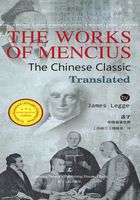
CHAPTER X
1. K'wang Chang said to Mencius, 'Is not Ch'ăn Chung a man of true self-denying purity? He was living in Wû-ling, and for three days was without food, till he could neither hear nor see.


12. See Pt. I. iv. 16. The remark in the note there is equally applicable to the quotation here.
13. 詖行,—行, in 2nd tone. Compare Bk. II. Pt. I. ii. 17.
14. This concluding remark is of a piece with the hesitancy shown by Mencius in Bk. II. Pt. I. ii, to claim boldly his place in the line of sages along with Confucius.
CHAPTER 10. THE MAN WHO WILL AVOID ASSOCIATION WITH, AND OBLIGATION TO,THOSE OF WHOM HE DOES NOT APPROVE,MUST NEEDS GO OUT OF THE WORLD.
1. Kw'ang Chang and Ch'ăn Chung, called also Ch'ăn Tsze-chung (子终), were both men of Ch'î, the former high in the employment and confidence of the prince, the latter, as we learn from this chapter,belonging to an old and noble family of the State. His principles appear to have been those of Hsü Hsing (Pt.I. iv), or even more severe. We may compare him with the recluses of Confucius's time. Wû-ling (於 read wû) appears to have been a poor wild place, to which Chung and his wife, like-minded with himself, had retired. It is referred either to the district of Ch'angshan or that of Tsze ch'wan in the department of Ts'î-nan.


Over a well there grew a plum-tree, the fruit of which had been more than half eaten by worms. He crawled to it, and tried to eat some of the fruit, when, after swallowing three mouthfuls, he recovered his sight and hearing.'
2. Mencius replied, 'Among the scholars of Ch'î, I must regard Chung as the thumb among the fingers.But still, where is the self-denying purity he pretends to? To carry out the principles which he holds, one must become an earthworm, for so only can it be done.
3. 'Now, an earthworm eats the dry mould above,and drinks the yellow spring below. Was the house in which Chung dwells built by a Po-î? or was it built by a robber like Chih? Was the millet which he eats planted by a Po-î? or was it planted by a robber like Chih? These are things which cannot be known.'


The 螬 is a worm proper to excrementitious matter.The term here is used, I suppose, to heighten our sense of the strait to which Chung was reduced by his selfdenial. 咽, read yen, 4th tone,=吞, 'to swallow'.
2. 充=推而满之, 'to carry out fully'.
3. Po-î,—see Analects, V. xxii, et al. Chih was a famous robber chief of Confucius's time, a younger brother of Hûi of Liû-hsiâ. There was, however, it is said, in high antiquity in the times of Hwang-tî, a noted robber of the same name, which was given to Hûi's brother, because of the similarity of his course.Tâo Chih (the robber Chih) has come to be like a proper name. —As Chung withdraw from human society, lest, he should be defiled by it, Mencius shows that unless he were a worm, he could not be independent of other men. Even the house he lived in,and the millet he ate, might be the result of the labour of a villain like Tâo-chih, or of a worthy like Po-î, for anything he could tell.


4. 'But,' said Chang, 'what does that matter? He himself weaves sandals of hemp, and his wife twists and dresses threads of hemp to sell or exchange them.'
5. Mencius rejoined, 'Chung belongs to an ancient and noble family of Ch'î. His elder brother Tâi received from Kâ a revenue of 10,000 chung, but he considered his brother's emolument to be unrighteous,and would not eat of it, and in the same way he considered his brother's house to be unrighteous,and would not dwell in it. Avoiding his brother and leaving his mother, he went and dwelt in Wû-ling.One day afterwards, he returned to their house, when it happened that some one sent his brother a present of a live goose. He, knitting his eyebrows, said, "What are you going to use that cackling thing for?" By-andby his mother killed the goose, and gave him some of it to eat. Just then his brother came into the house,and said, "It is the flesh of that cackling thing," upon which he went out and vomited it.
6. 'Thus, what his mother gave him he would not eat,but what his wife gives him he eats.


4. 何伤,—compare 无伤 in Bk. I. Pt. I. vii. 3. 织履,—see Pt. I. iv. 辟, read pi,=绩, to twist, as threads of hemp on the knee. This meaning is not found in the dictionary, but Châo Ch'î explains it by 缉绩, and 纑by 练, 'to prepare for weaving'.
5. 盖,—in 4th tone, as in Bk. II. Pt. II. vi. 1. 禄万鈡,—see Bk. II. Pt. II. x. 3. 辟,—the same as 避.


He will not dwell in his brother's house, but he dwells in Wû-ling. How can he in such circumstances complete the style of life which he professes? With such principles as Chung holds, a man must be an earthworm, and then he can carry them out.'


频顣, used for 颦蹙. 鶂,—read nî, the sound made by a goose. 是鶂鶂者,—'this cackler'.
6. 以母则不食 is expanded by Chû Hsî,—以母之食为不义而不食, 'he considered what his mother gave him to eat not to be righteous, and would not eat it'.Similarly he brings out the force of the以in the other clauses. The glossarist of Châo Ch'î treats it more loosely, as in the translation.